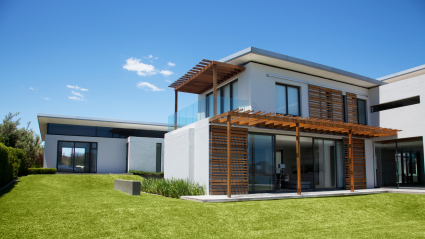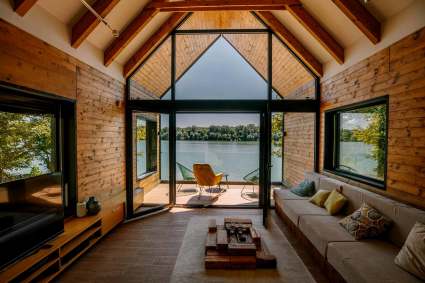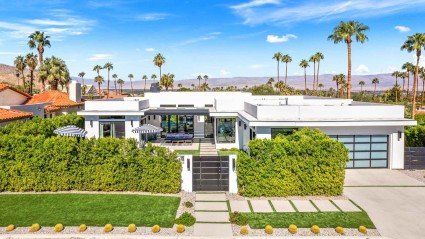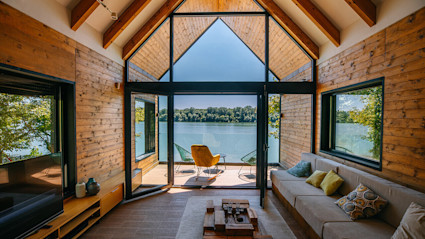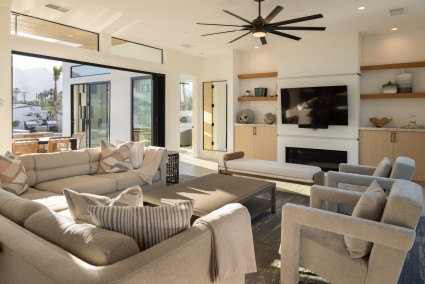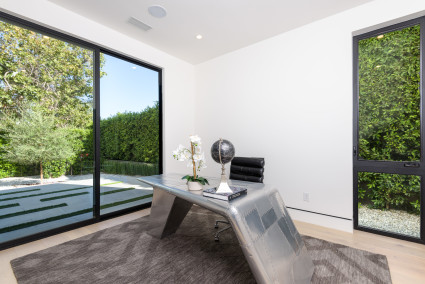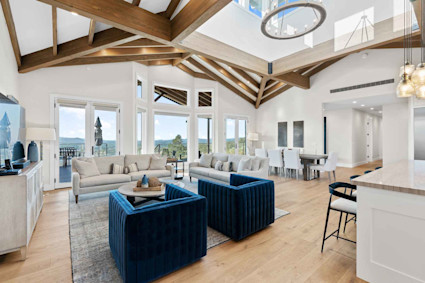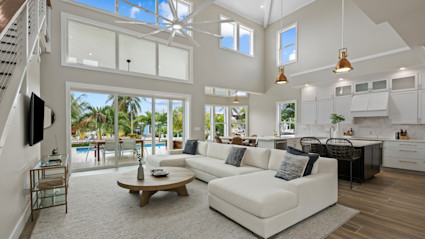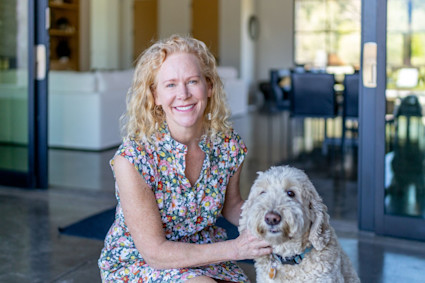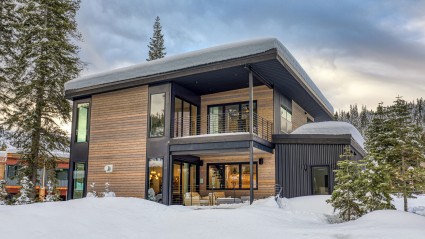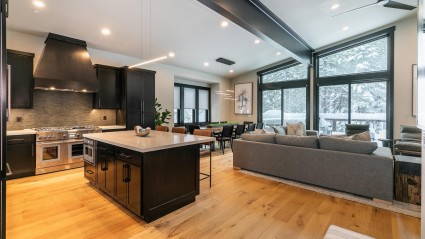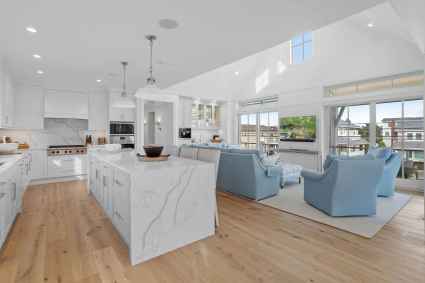19 of the best East Coast beach towns to visit in 2025
Dreaming of sun-drenched shores and ocean waves? The East Coast offers a treasure trove of captivating coastal destinations, each with unique charm. For those seeking the best east coast beach towns to escape to, the possibilities are endless, whether for a week or a season. Now, imagine the flexibility of a vacation home — a personal retreat where you can unwind and recharge whenever the mood strikes. Below, we’ll cover some of the top East Coast beach towns, highlighting what makes each one special and perfect for a 1. Bar Harbor, Maine Bar Harbor, Maine, a quintessential example of charming northeast beach towns, is a gateway to the beauty of Acadia National Park, making it a unique East Coast destination. With its granite peaks, pristine lakes and dramatic coastline, Acadia National Park provides endless opportunities for hiking, biking, kayaking and wildlife viewing. The iconic Cadillac Mountain offers stunning panoramic views, especially at sunrise. Beyond the park, Bar Harbor has a vibrant atmosphere. Stroll along the waterfront, explore local shops and art galleries and savor fresh seafood around town. Whale-watching tours and boat cruises let you explore the surrounding marine life. 2. Newport, Rhode Island Newport, Rhode Island is often considered one of the more sophisticated northeast beach towns. It's known for its stunning mansions along Bellevue Avenue, offering a glimpse into a historic era of opulence. Tour these architectural marvels, remnants of the summer "cottages" of wealthy industrialists, and experience the grandeur of the past. Explore Easton's Beach (also known as First Beach), with expansive sandy shores perfect for sunbathing and swimming. The rugged coastline dotted with scenic coves is the perfect backdrop for outdoor activities and exploration. Beyond the harbor, enjoy the charming cobblestone streets lined with boutiques, art galleries and acclaimed restaurants. The Cliff Walk, a scenic path overlooking the Atlantic Ocean, provides views of the coastline and historic mansions. Newport's blend of history and coastal beauty makes it perfect for those seeking a refined escape, which is likely why it was named among the 3. Nantucket, Massachusetts Nantucket also boasts a vibrant cultural scene, with art galleries, museums and a variety of festivals. Upscale boutiques, gourmet restaurants and charming inns add to its refined atmosphere. For those drawn to the unique allure of Nantucket, exploring 4. Montauk, New York Montauk, New York, is known for its rugged beauty, world-class surf breaks and thriving fishing scene. This coastal gem offers a sophisticated yet relaxed atmosphere. The iconic Montauk Point Lighthouse, overlooking the Atlantic Ocean, is a symbol of the town's maritime heritage. The beaches, particularly Ditch Plains, attract surfers from around the globe. Montauk is also a haven for anglers, with numerous charter boats offering deep sea fishing excursions. The town's harbor is filled with marinas, seafood restaurants and shops. Beyond the beaches and fishing, Montauk’s rugged charm is great for hiking, biking and exploring the natural beauty of the surrounding area. 5. Cape May, New Jersey Cape May, New Jersey, is known for its beautifully preserved Victorian architecture and elegant seaside ambiance. You’ll find a unique blend of history, culture and natural beauty. Stroll along the gaslit streets to admire the colorful Victorian mansions lining the avenues — a picturesque and romantic setting. The beaches, known for their cleanliness and tranquility, provide a peaceful escape for sunbathing and swimming. Cape May also boasts a vibrant cultural scene, with art galleries, theaters and festivals throughout the year. The Cape May Lighthouse offers panoramic views of the coastline, and whale-watching tours let you observe marine wildlife. The town's upscale boutiques, gourmet restaurants and charming bed-and-breakfasts all contribute to its sophisticated atmosphere, as well as its place among the 6. Avalon, New Jersey Beyond the beaches, Avalon’s town center offers boutique shops, gourmet restaurants and a strong sense of community. The town's focus on preserving its natural environment and fostering a relaxed atmosphere makes it an ideal location for those looking to create lasting family memories. 7. Bethany Beach, Delaware Bethany Beach, Delaware, is a laid-back town with wide, sandy beaches perfect for swimming, sunbathing and building sandcastles. The boardwalk offers a variety of shops, restaurants and ice cream parlors, creating a classic beach town experience. Bethany Beach is also known for its focus on outdoor recreation, with plenty of places to bike, kayak and explore the nearby state parks. The town's family-friendly atmosphere, combined with its commitment to preserving its natural beauty, makes it among the best small beach towns on the east coast. 8. Ocean City, Maryland Ocean City, Maryland, is a quintessential East Coast beach town known for its vibrant atmosphere and family-friendly appeal, making it one of the Beyond the boardwalk, Ocean City offers a variety of attractions that make it an ideal second home destination. Explore Assateague Island, home to wild ponies, or enjoy a day of fishing or boating in the bay. With its classic beach town charm and modern amenities, Ocean City provides a lively environment for those looking for the best beach towns on the East Coast. 9. Chincoteague, Virginia Chincoteague, Virginia, is a serene island known for its natural beauty and wildlife, particularly the famous wild Chincoteague ponies. The Chincoteague National Wildlife Refuge provides opportunities for bird-watching, hiking and exploring diverse ecosystems, and the beaches are pristine and uncrowded. The annual Pony Swim showcases the island's unique connection to its wild inhabitants. Beyond the ponies, the island's charming town center features local shops, seafood restaurants and a relaxed atmosphere. Chincoteague provides a perfect retreat for those seeking the 10. Virginia Beach, Virginia Virginia Beach is one of the best East Coast beach towns if you want to enjoy natural beauty and exciting attractions. It's among the best family vacation spots thanks to its expansive beaches and lively boardwalk. The iconic Virginia Beach Boardwalk offers amusement rides and arcades, or you can take your kids to the Virginia Aquarium & Marine Science Center for entertaining exhibits about marine life. Beyond the bustling boardwalk, Virginia Beach offers a diverse range of outdoor activities. First Landing State Park, where English colonists first landed in 1607, provides opportunities for hiking, kayaking and exploring natural habitats. The area also boasts a thriving culinary scene, with fresh seafood and a variety of dining options. Virginia Beach was also rated among Pacaso’s 11. Nags Head, North Carolina Nags Head, North Carolina, is known for its rolling dunes and laid-back atmosphere. This coastal gem offers a perfect retreat if you want to connect with nature and a slower pace of life. Visit Jockey's Ridge State Park to see towering sand dunes and opportunities for hang gliding, kite flying and viewing stunning sunsets. The beaches are ideal for surfing, fishing or just enjoying the vast expanse of the Atlantic Ocean. Nags Head is also known for its charming cottages and a strong sense of community. The historic Jennette's Pier is a popular spot for fishing and sightseeing and also offers educational programs about the local marine environment. The area's natural beauty, combined with its friendly atmosphere, offers an authentic coastal experience. 12. Myrtle Beach, South Carolina If you’re looking for a Beyond the beaches and golf courses, Myrtle Beach offers live entertainment theaters, water parks and the popular Broadway at the Beach complex. The area's diverse culinary scene caters to all tastes, from fresh seafood to international cuisine. With its vibrant atmosphere and a plethora of activities, Myrtle Beach won’t disappoint, especially if you’re looking for 13. Pawleys Island, South Carolina Pawleys Island, South Carolina, is known for its relaxed atmosphere and rich history. This barrier island offers a respite from the hustle and bustle of modern life, focusing on preserving its natural beauty and traditional Lowcountry charm. The beaches are perfect for leisurely strolls, shelling and simply enjoying the peaceful sound of the ocean. Pawleys Island is also known for its iconic rope hammocks and its historic homes and cottages. The slow pace of life and emphasis on outdoor activities, like fishing, crabbing and kayaking, make it the perfect spot for a relaxing coastal trip. Its proximity to charming Georgetown and the attractions of Myrtle Beach also provide a balance of seclusion and access to nearby amenities. 14. Sullivan’s Island, South Carolina For those looking for small beach towns on the east coast with a strong sense of local charm, The beaches are perfect for swimming, while Fort Moultrie, a Revolutionary War fort, stands as a testament to the island’s historic past. If you’re looking for a vacation home in a place with a laid-back coastal lifestyle, you’ll enjoy Sullivan’s Island. 15. Hilton Head, South Carolina Beyond the beaches and golf, Hilton Head offers a wide range of activities, including biking along miles of paved trails, kayaking through scenic waterways and exploring the island's nature preserves. Hilton Head is also known for its sophisticated dining scene, upscale shopping and vibrant cultural events. 16. Tybee Island, Georgia Tybee Island, Georgia, uniquely blends historical significance and natural beauty. The island is a relaxing place to visit with an unpretentious atmosphere — and it's just a short drive from Savannah. The Tybee Island Lighthouse, one of the oldest operating lighthouses in the U.S., points to the island's rich maritime heritage. Explore Fort Pulaski National Monument, a well-preserved Civil War fort, or enjoy the miles of unspoiled beaches. Tybee Island is also a haven for nature enthusiasts. Dolphin-watching, kayaking through marshlands and bird-watching are popular activities. With its friendly locals, delicious seafood and a slow pace of life, Tybee Island offers a perfect escape for those seeking a tranquil and culturally rich East Coast beach town. 17. St. Augustine, Florida St. Augustine, Florida, offers a unique blend of historical significance and coastal allure. The city's rich past is evident in its well-preserved architecture, like the iconic Castillo de San Marcos National Monument, a 17th-century fortress overlooking the Matanzas River. Walking through the cobblestone streets of the historic district feels like stepping back in time, with numerous museums and art galleries to explore. St. Augustine also has beautiful beaches, including St. Augustine Beach and Anastasia State Park. The city's vibrant cultural scene, with its festivals, live music and diverse culinary offerings, adds to its appeal, especially if you’re interested in 18. Siesta Key, Florida Siesta Key, Florida, is renowned for its stunning beaches, particularly Siesta Beach, which boasts quartz crystal sand that stays cool even in the hottest sunshine. This makes it an ideal spot if you’re after a more comfortable and luxurious beach experience. The tranquil, turquoise waters are perfect for swimming, paddleboarding and kayaking. Beyond the beach, Siesta Key Village offers an array of boutiques, restaurants and entertainment options. The relaxed yet sophisticated atmosphere is great for unwinding and enjoying the finer things in life, whether strolling along the shoreline at sunset or enjoying a seafood dinner overlooking the Gulf of Mexico. 19. Miami, Florida Beyond the beaches, Miami offers a wealth of cultural attractions, including world-renowned museums, arts districts and a thriving music scene. The city's diverse population and multicultural influences create a dynamic and exciting atmosphere. Overall, Miami uniquely blends urban excitement with a tropical paradise for those seeking the most relaxing places to visit in the U.S. who still want some energy in their trip. Find your perfect East Coast beach town vacation home From the historic shores of Cape May to the sun-kissed sands of Florida, the best East Coast beach towns offer a diverse array of experiences for your next coastal escape. Consider your ideal lifestyle, whether it's filled with adventure, relaxation or a blend of both, as you explore the possibilities of co-owning a vacation home in one of these stunning locations with Pacaso. Explore our curated
Read










